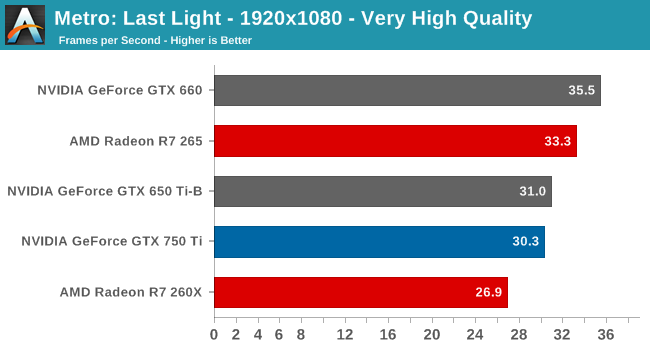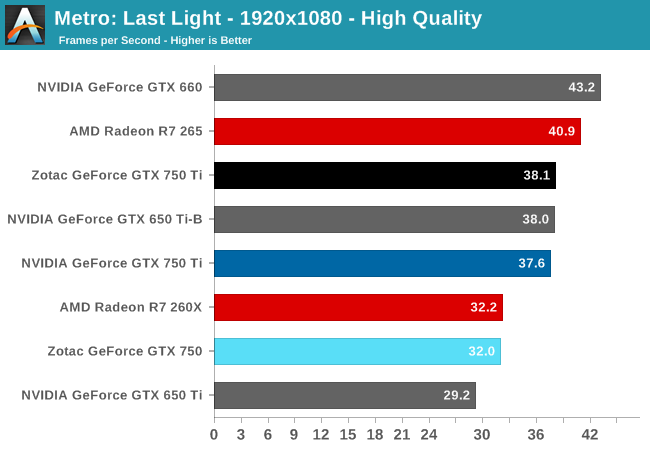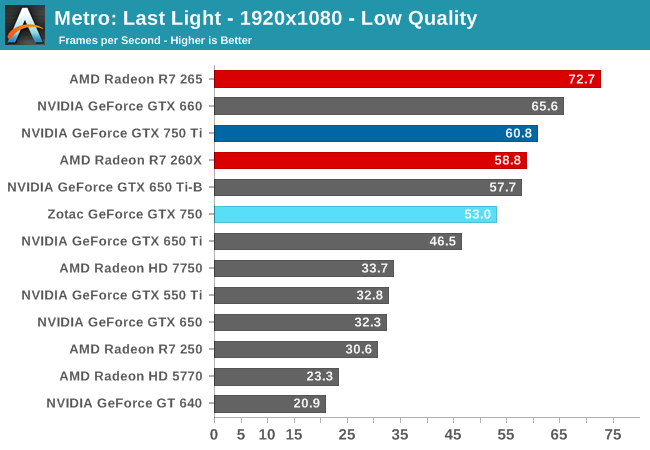The NVIDIA GeForce GTX 750 Ti and GTX 750 Review: Maxwell Makes Its Move
by Ryan Smith & Ganesh T S on February 18, 2014 9:00 AM ESTMetro: Last Light
As always, kicking off our look at performance is 4A Games’ latest entry in their Metro series of subterranean shooters, Metro: Last Light. The original Metro: 2033 was a graphically punishing game for its time and Metro: Last Light is in its own right too. On the other hand it scales well with resolution and quality settings, so it’s still playable on lower end hardware.



Diving into our performance analysis, we’ll be looking at a few different factors. On a competitive basis, the GTX 660 and the R7 265 are the GTX 750 Ti’s closest competitors. Though we’ll also want to compare it to GTX 650, so see what a GK107 versus GM107 matchup looks like. Meanwhile the GTX 750’s closest competitors will be the R7 260X, and to a lesser degree the GTX 650 Ti.
Being one of our more difficult games, Metro shows right off the bat that these mainstream video cards, no matter how fast they are, will face a difficult time. The GTX 750 Ti can stay comfortably above the 30fps at high quality, but the GTX 750 not so much.
What’s clear right off the bat two is two things. The first is that GTX 750 Ti, the GM107 flagship, is significantly faster than GTX 650, the GK107 flagship. GTX 750 Ti is just short of doubling GTX 650’s performance in this benchmark.
The second point is that neither GTX 750 series card is going to fare well against its AMD counterpart. Both the R7 265 and R7 260 are faster than the GeForce cards, and by over 10% at times.
Finally, GTX 750 Ti won’t be touching GTX 660 here. It’s close, but especially at higher quality settings the GTX 660 is pulling away. GTX 750 Ti can’t completely make up for the lack of memory bandwidth and ROP throughput.










177 Comments
View All Comments
texasti89 - Tuesday, February 18, 2014 - link
http://media.bestofmicro.com/4/R/422667/original/F...texasti89 - Tuesday, February 18, 2014 - link
Also I was referring to the 750ti (60w) not the 750 (55w) in my comment. Words in the article reflect reviewers opinions. Benchmark results from various tech websites give same conclusion.texasti89 - Tuesday, February 18, 2014 - link
Another one to look at : http://www.techpowerup.com/reviews/NVIDIA/GeForce_...tspacie - Tuesday, February 18, 2014 - link
[Coming soon to a flu near you]This is a caching error or similar on page 4, right?
mindbomb - Tuesday, February 18, 2014 - link
Hello Ryan and Ganesh. I'd like to point out for your video tests that there is no luma upscaling or image doubling for a 1080p video on a 1080p display, since luma is already scaled. You need to test those with a 720p video, and they are mutually exclusive, since image doubling will convert 1280x720 to 2560x1440, where you will need to downscale rather than upscale.ganeshts - Tuesday, February 18, 2014 - link
Luma upscaling is present for 480i / 576i / 720p videos and downscaling for the 4Kp30 video. We have nine different sample streams.jwcalla - Tuesday, February 18, 2014 - link
I'd like to see AT adopt some OpenGL benchmarks in the future.Us OpenGL consumers are out here. :)
Ryan Smith - Thursday, February 20, 2014 - link
So would I. But at the moment there aren't any meaningful games using OpenGL that are suitable for benchmarking. After Wolfenstein went out of date and Rage was capped at 60fps, we ended up stuck in that respect.Roland00Address - Tuesday, February 18, 2014 - link
Feel better Ryan, don't let the flu get you down! (Or is it Ganesh T S?)Looks like Nvidia has a 8800gt/9800gt on its hands (for different reasons than the original 8800gt)
Hrel - Tuesday, February 18, 2014 - link
Seriously impressive performance/watt figures in here. Makes me wonder when we're going to see this applied to their higher end GPU's.Looking at TSMC's site they are already producing at 20nm in 2 fabs. Starting in May of this year they'll have a 3rd up. Do you think it's likely May/June is when we'll see Maxwell make it's way into higher end GPU's accompanied by a shift to 20nm?
That approach would make sense to me, they'd have new product out in time for Summer Sales and have enough time to ramp production and satiate early adopters before back to school specials start up.
On a personal note: I'm still running a GTX460 and the GTX750ti seems to be faster in almost every scenario at lower power draw in a smaller package. So that's pretty cool. But since TSMC is already producing 20nm chips I'm going to wait until this architecture can be applied at a smaller manufacturing process. That GPU is in a media PC, so gaming is a tertiary concern anyway.